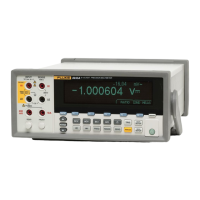Introduction and Specifications
Measurement Uncertainty 1
1-21
Diode Test
Test Current........................................................... 100 μA or 1 mA
Response Time ..................................................... 300 samples/sec with audible tone.
Accuracy is given as ± (% measurements + % of range)
Range
24 Hour
(23 ±1 °C)
90 Days
(23 ±5 °C)
1 Year
(23 ±5 °C)
Temperature
Coefficient/ °C
Outside 18 to 28 °C
5.0000 V 0.002 + 0.002 0.008 + 0.002 0.01 + 0.002 0.001 + 0.002
10.0000 V 0.002 + 0.001 0.008 + 0.002 0.01 + 0.002 0.001 + 0.002
Measurement Rates
Measurements/Second
[1]
Function Digits Setting
Integration Time
60 Hz (50 Hz)
8845A 8846A
6½ 100 NPLC 1.67 (2) s 0.6 (0.5) 0.6 (0.5)
6½ 10 NPLC 167 (200) ms 6 (5) 6 (5)
5½ 10 NPLC 16.7 (20) ms 60 (50) 60 (50)
DC Volts, DC Current, and
Resistance
5½ 0.2 NPLC 3 ms 300 300
6½ 3 Hz 0.14 0.14
6½ 20 Hz 1 1
6½ 200 Hz
[3]
1.6 1.6
AC Voltage and AC Current
[2]
6½ 200 Hz
[4]
6 6
6½ 1 s 1 1
5½ 100 ms 9.8 9.8
Frequency and Period
4½ 10 ms 80 80
[1] Typical measurement rates with auto-zero off.
[2] Maximum measurement rates for 0.01 % of ac step. When dc input varies, additional settling delay is required.
[3] For remote operation or external trigger using default settling delay
[4] Settling delay = 0
Measurement Uncertainty
The Meter's measurement uncertainties are expressed in the form ( % of reading + % of
range ). In addition to the reading error and range error, you may need to add additional
errors for certain operating conditions. If the Meter is operated outside the temperature
range specified, an additional temperature coefficient error must be applied. For dc
voltage, dc current, and resistance measurements, apply an additional reading-speed
error. For ac voltage and ac current measurements, apply an additional low frequency
error or crest factor error.
The "% of reading" error varies according to the input level on the selected range. This
error is expressed in percent of input measurement. The “% of range” error represents the
floor noise of the range and represents the lowest meaningful resolution for that range.
The following example shows the reading error applied to the Meter's 24-hour 10 Vdc
specification: 0.0013% of input + 0.0004% of range.
Assuming the Meter is set to the 10V range with an input voltage of 1 V, the
measurement uncertainty would be: +/- [(0.0013% x 1V) + (.0004% x 10V)].
Permissible High Value = 1 + 0.000053V = 1.000053 V
Permissible Low Value = 1 - 0.000053V = 0.999947 V

